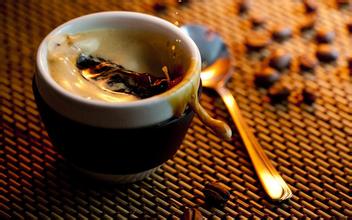Fragrant and full-bodied flavor description of Kenyan coffee beans introduction of varieties in manor area
Delicious coffee, in addition to pay attention to the appropriate temperature, but also have the right amount. Drinking coffee is not like drinking or juice, a full cup of coffee, watching it will lose interest in drinking. Generally speaking, it is only seven or eight minutes full for the right amount, moderate amount of coffee will not only stimulate the taste, after drinking it will not have a "greasy" feeling, but endless aftertaste. At the same time, the right amount of coffee can moderately promote the body to recover from fatigue and refresh the mind.
There are different flavors of coffee, so you can't drink three or four cups in a row like tea or cola, but the size of a formal coffee cup is just right. Ordinary coffee to 80-100cc for the right amount, sometimes if you want to drink three or four cups in a row, then it is necessary to dilute the concentration of coffee, or add a lot of milk, but still take into account the degree of physical needs, to add or reduce the concentration of coffee, that is, do not cause greasy or nauseous feeling, and in the allocation of sugar might as well be more changes to make the coffee more delicious.
Aromatic, full-bodied, with fruit flavor, taste rich and perfect. Kenyan coffee has a wonderful fruit flavor, tastes like BlackBerry and grapefruit, and is a favorite of many coffee gluttons. This coffee has an excellent medium purity, crisp and refreshing taste. It has a fresh flavor and is most suitable for drinking iced coffee in summer. When tasting this coffee, if it is paired with sour fruits such as grapefruit, it will certainly give me the best coffee experience. "not much like coffee, but a bit like fruit tea" is the common feeling of many people about this kind of shallow roasted Kenyan coffee. In addition to having obvious and fascinating fruit acid, Kenyan coffee comes mostly from small coffee farmers and don't underestimate Kenyan small farmers, who are no less ant soldiers, with an overall production capacity higher than that of large farms, at a ratio of about six to four, which is rare in bean-producing countries. Kenyan coffee is widely appreciated by connoisseurs, thanks in large part to small farmers guarding the foothills and producing high-quality coffee. In addition, Kenya beans must have a strict grading system. Coffee beans taken out by washing plants are divided into five grades according to size, shape and hardness, with the highest being PB, followed by AA++, AA+, AA and AB. This grading system is similar to Colombia, mainly in terms of particle size and shape, but selling well does not necessarily lead to good flavor. This is what coffee fans should know. The current international evaluation of Kenyan beans is not as good as in previous years. It is believed that this has something to do with the abnormal climate, which is not conducive to the growth of coffee, but the matter is not so simple. This is related to the Kenyan authorities' efforts to promote the new variety Ruiru11 with stronger disease resistance and higher yield per unit. According to the taste test, the new variety with higher economic value has a worse flavor than the traditional variety, and to make matters worse, Ruiru11 is about to replace the traditional Arabica and Bourbon varieties. In addition, the quality of coffee is declining, the auction price is not good, and the income of small farmers is reduced. Coupled with the fact that the coffee management bureau is not a paradox, farmers' enthusiasm for coffee will be greatly reduced, which will of course affect the quality of coffee. In addition, Kenya's outstanding washing technology has also declined, which is the killer of strangling quality.

Important Notice :
前街咖啡 FrontStreet Coffee has moved to new addredd:
FrontStreet Coffee Address: 315,Donghua East Road,GuangZhou
Tel:020 38364473
- Prev

Flavor description of Brazilian Coffee beans introduction to the varieties treated in the manor area
There are many large farms in Brazil, which run endless coffee plantations. They use machines to harvest and dry them. They are so efficient in automation that they regard coffee as a general agricultural material and completely abandon the flavor and flavor. As a result, many select coffee companies simply do not sell Brazilian beans so as not to demean themselves. In the select coffee shop, there is still an occasional Sandoska in Brazil.
- Next

Description of flavor of coffee beans in Rwanda introduction of grinding scale of taste treatment method in manor area
Rwanda is a small African country, and the local people are relatively poor, but it produces straight and very good coffee. Unlike its neighbors Kenya and Ethiopia, Rwanda's coffee is mainly round bourbon. The taste is not as prominent as Ethiopia and Kenya, but the evenness is excellent. Karnogi coffee in Rwanda is grown and harvested by local small farmers and is produced by Git
Related
- Detailed explanation of Jadeite planting Land in Panamanian Jadeite Manor introduction to the grading system of Jadeite competitive bidding, Red bid, Green bid and Rose Summer
- Story of Coffee planting in Brenka region of Costa Rica Stonehenge Manor anaerobic heavy honey treatment of flavor mouth
- What's on the barrel of Blue Mountain Coffee beans?
- Can American coffee also pull flowers? How to use hot American style to pull out a good-looking pattern?
- Can you make a cold extract with coffee beans? What is the right proportion for cold-extracted coffee formula?
- Indonesian PWN Gold Mandrine Coffee Origin Features Flavor How to Chong? Mandolin coffee is American.
- A brief introduction to the flavor characteristics of Brazilian yellow bourbon coffee beans
- What is the effect of different water quality on the flavor of cold-extracted coffee? What kind of water is best for brewing coffee?
- Why do you think of Rose Summer whenever you mention Panamanian coffee?
- Introduction to the characteristics of authentic blue mountain coffee bean producing areas? What is the CIB Coffee Authority in Jamaica?

